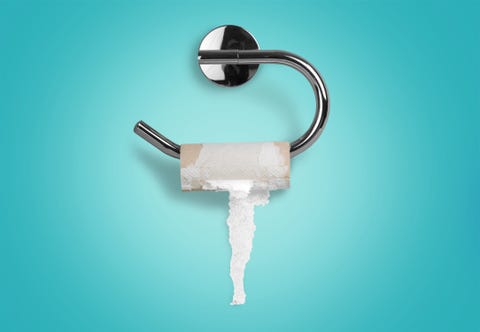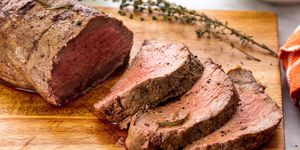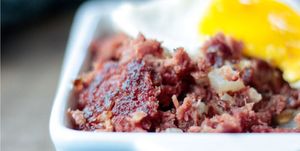
It’s true: The keto diet can help some people lose a significant amount of weight.
But sometimes that weight loss comes with a cost—and when it comes to the high-fat, moderate-protein, low-carb keto diet, sometimes one of the biggest side effects is keto diarrhea.
How can the keto diet cause diarrhea?
The reason, says Barbie Boules, R.D.N., founder of Nyoutrition, is that some people don’t digest fat—and their bodies don’t put it to use—as well as they should to begin with and, well, the keto diet is 70 to 80 percent fat.
pros of being back on keto: losing weight, more energy, insomnia isn’t as bad
cons: so much diarrhea
That extra fat that the body doesn’t use comes out in your stools, making them, uh, more fluid than usual. (To be clear: Boules doesn’t advocate or encourage the keto diet because of that high fat content. “We have no idea what effect a diet that high in fats has on long-term health,” she says.)
Another keto diarrhea culprit: Using non-nutritive sweeteners (think: aspartame or Splenda) or sugar alcohols (like sorbitol or xylitol) to replace real sugar on keto might also cause digestive troubles. “Sorbitol in particular is notorious for causing GI upset,” she says, like cramping and bloating, in addition to diarrhea.
So, diarrhea isn’t a symptom of keto flu?
Not necessarily. While, yes, diarrhea is a symptom of the keto flu, you’ll also have other symptoms like headaches, difficulty focusing, nausea, and trouble sleeping.
But, while the keto flu typically resolves in two weeks—after your body gets used to being in ketosis (a.k.a. the state of burning fat for fuel instead of carbs)—keto diarrhea doesn’t necessarily have a stopping point. Especially if your body has trouble processing fat.
“Any time you radically change what you’re eating, your GI system may react. This can happen when starting probiotics, or a high-fiber diet as well,” Boules says.
Don’t be surprised if the high-fat diet also makes your poop float. While it could be harmless, floaters might point at malabsorption and/or too much gas. If it lasts for more than two weeks, then you should see your doc (or consider revising your dietary plan).
How can I stop keto diarrhea?
If you’re committed to giving keto a go and you initially experience diarrhea, “aim to stay hydrated and increase fiber,” says Boules, as that can help your body adjust to ketosis, bulk up your poop, and help reduce bathroom trips.
You can increase your fiber intake by adding more veggies to your plate, like leafy greens and broccoli. If that’s not your jam, you can add a fiber supplement to your diet.
Keep in mind, though, that taking an anti-diarrheal medicine like Immodium is basically a bandaid—it can put a pause on your bowels, but it won’t fix the root problem (i.e., the diet choices leading to diarrhea in the first place).
If your diarrhea persists after the keto flu period, however, it might be time to start looking at your food choices—like cutting back on the artificial sweeteners and focusing on healthy fats (like avocado and olive oil) instead of (still keto) but less-healthy ones (like various cheeses and bacon).
But you might also have to accept that keto just isn’t your thing: “If the diarrhea continues, this food philosophy probably isn’t the best fit for you,” Boules says.
And, really, the most successful diet is one that you’ll feel comfortable sticking to—which likely won’t make you run to the bathroom every five minutes.



From: Women's Health US
Source: Read Full Article
